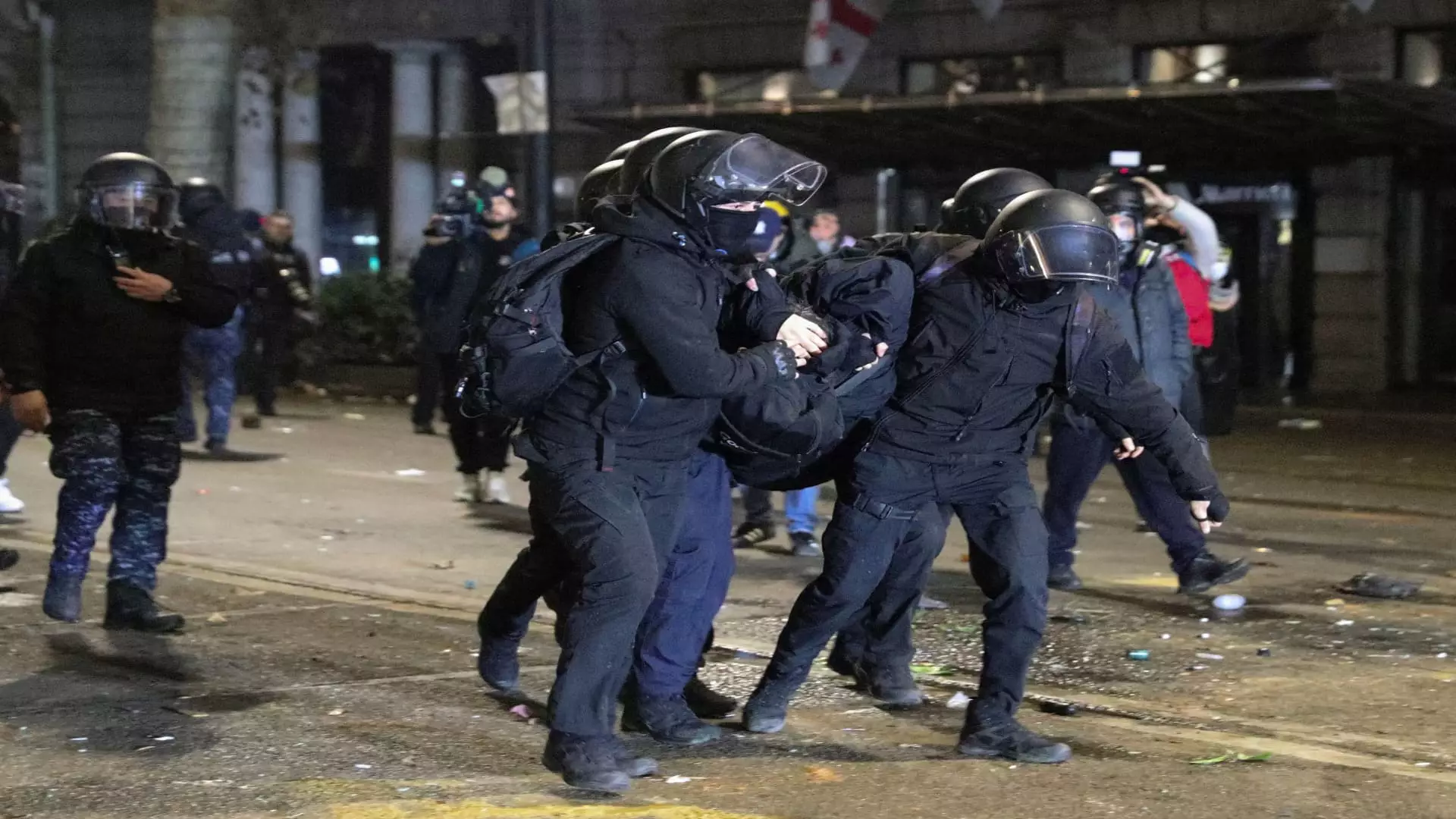In recent days, the capital city of Tbilisi has witnessed escalating protests as citizens express their dissatisfaction with the Georgian government’s abrupt decision to suspend discussions regarding European Union accession. With tensions boiling over, the demonstrations have seen tens of thousands gather in front of the parliament building, leading to a significant escalation of violence and unrest. Reports indicate that 44 individuals were hospitalized as a result of confrontations between protesters and law enforcement, highlighting the increasingly volatile atmosphere.
Demonstrators took to the streets on Saturday night, utilizing various forms of protest, including throwing stones, igniting fireworks, and even burning an effigy of Bidzina Ivanishvili, the influential founder of the ruling Georgian Dream party. His billionaire status, acquired during his time in Russia, has made him a controversial figure, deeply resented by many Georgians. The clash intensified as police responded with water cannons and tear gas, aiming to disperse the mass protests.
Prime Minister Irakli Kobakhidze has vowed to uphold law and order, warning that any perceived violations will encounter severe repercussions. His insistence that European integration efforts have not been thwarted reveals a reluctance to acknowledge the anger pulsating through Georgian society. He referred to the claims that the negotiations with the EU had been cancelled as “shameful and offensive blackmail,” signaling a persistent determination to counter the narrative being shaped by opposition leaders and segments of the public.
Critics of the government, however, remain unconvinced by these assurances. The announcement to suspend EU negotiations came in the wake of criticism from the European Parliament pertaining to the legitimacy of Georgia’s recent general elections, which were labeled as neither free nor fair. This international condemnation exacerbates the domestic discontent and casts additional doubts on the government’s ability to navigate its western aspirations while managing internal dissent.
The international community has weighed in on the situation, with Georgia’s strategic partnership with the United States also hanging in the balance. A recent statement from the U.S. State Department condemned the Georgian government’s decision, indicating a potential realignment of foreign relations that could have ramifications for Georgia’s geopolitical stance. Kobakhidze dismissed the significance of these critiques, attributing them to the actions of the previous administration and outlining a willingness to engage with new partners.
Notably, EU officials, including foreign policy chief Kaja Kallas and enlargement commissioner Marta Kos, voiced deep concerns over the suspension of negotiations. Their joint statement emphasized a stark departure from the European aspirations that have historically united the Georgian government and its populace. The EU’s position recognizes the persistent democratic backsliding in Georgia, compelling the government to uphold democratic norms such as freedom of assembly and expression, particularly in light of ongoing protests.
The opposition parties have responded to the government’s actions by calling for a boycott of parliament and demanding new elections. Allegations persist that the recent parliamentary vote was manipulated through external influences, notably from Russia, which has a vested interest in maintaining its historical grip over Georgia. President Salome Zourabichvili, whose pro-Western stance complements that of the opposition, has voiced her concerns regarding what she perceives as a shift towards a “quasi-Russian” state as Georgian Dream consolidates power.
Zourabichvili’s call for new elections underscores the widespread disillusionment with the current ruling party and the mechanisms of governance. While protests have intensified, the demand reflects a desire for authentic representation of the people’s will, emphasizing transparency and accountability in the electoral process. The reform discourse is further complicated by the EU’s previous granting of candidate status to Georgia, which now hangs precariously in light of the government’s controversial decisions.
Georgia stands at a critical juncture as it grapples with internal strife, governmental authority, and aspirations for European integration. The protests signal a populace unwilling to settle for less than democratic governance and genuine representation. The guiding narrative of Georgia’s future—whether aligned with the European Union or swayed by external pressures—will depend largely on the government’s response to its citizens’ fervent demands for reform. How the situation unfolds will not only define the current administration’s legacy but also determine Georgia’s trajectory on the broader stage of European geopolitics.


Leave a Reply